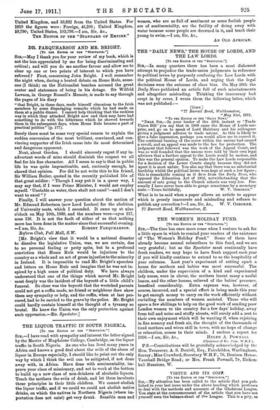DR. FARQUHARSON AND MR. BRIGHT.
[TO THE EDITOR OP THE "SPECTATOR.']
SIR,—May I thank you for your review of my book, which is not the less appreciated by me for being discriminating and critical; and will you do me another favour and allow me to clear up one or two points of interest to which you have
referred ? First, concerning John Bright. I well remember the night when, during a heated debate on Home Rule, some- one (I think) on the Nationalist benches accused the great orator and statesman of being in his dotage. Sir Wilfrid Lawson, in George Russell's Memoir, is made to say through the pages of his diary
"that Bright, in these days, made himself obnoxious to the Irish members by some disparaging remarks which he had made on them at a public dinner. I cannot help thinking that the reckless way in which they attacked Bright now and then may have had something to do with the bitterness which he showed towards them in the subsequent days, when Home Rule became a part of practical politics" (p. 177).
Surely there must be some very special reason to explain the sudden conversion of the most brilliant, convinced, and con- vincing supporter of the Irish cause into its most determined and dangerous opponent.
Next, about Gordon. I should sincerely regret if any in- advertent words of mine should diminish the respect we all feel for his fine character. All I mean to say is that in public life he was quite impracticable, and, curiously enough, he shared that opinion. For did he not write this to his friend, Sir William Butler, quoted in the recently published life of that great soldier : " Though I may put it in a queer way, I may say that, if I were Prime Minister, I would not employ myself. Unstable as water, thou shalt not excel '—and I don't want to excel " ?
Finally, I will answer your question about the motion of Mr. Edmund Robertson (now Lord Lochee) for the abolition of University seats, which I seconded. It came up at nine o'clock on May 10th, 1889, and the numbers were—ayes 217, noes 126. It is not the fault of either of us that nothing more has been done in the matter since that successful evening.
—I am, Sir, &c. ROBERT FA.RVIHARSON. Reform Club, Pall Mall, S.W.
[Mr. Bright's view that it would be a national disaster to dissolve the legislative Union, was, we are certain, due to no personal feeling or petty spite, but to a profound conviction that Home Rule would be injurious to the country as a whole and an act of gross injustice to the minority in Ireland. It is impossible to read Mr. Bright's speeches and letters on Home Rule and imagine that he was not in- spired by a high sense of political duty. We have always understood that one of the things which moved Mr. Bright most deeply was the incident of the boycott of a little child's funeral. So close was the boycott that the wretched parents could not get a coffin made, no friend or neighbour dare show them any sympathy or help, and the coffin, when at last pro- cured, had to be carried to the grave by the police. Mr. Bright could hardly contain himself at the thought of a tyranny so brutal. He knew the Union was the only protection against such oppression.—En. Spectator.]










































 Previous page
Previous page